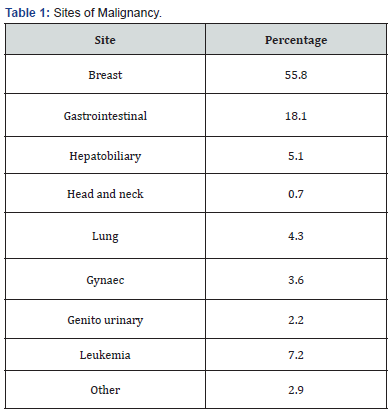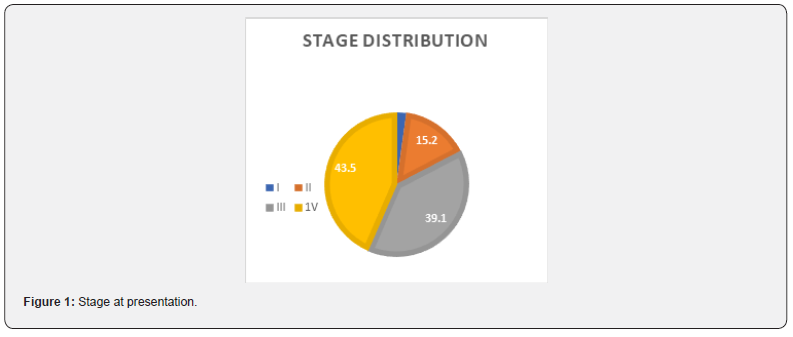Quality of Life and Psychological Morbidity in Cancer Patients Receiving Anticancer Therapy during the COVID Pandemic: A Cross Sectional Observational Study from a Tertiary Cancer Care Centre in South India
Naveen Ravel1, Teena rajan2*, Alexander Gnanadurai W J3, Sathiyamoorthy P N4, Arun Ramanan5, Chandralekha K5, Chodavarapu Dheeraj2, Meena K2 and Pothala Vijayalakshmi2
1Professor and Head of the Department of Medical Oncology, Stanley Medical College, India
2Senior Resident, Department of Medical Oncology, Stanley Medical College, India
3Professor and Head of the Department of psychiatry, Stanley Medical College, India
4Associate Professor, Department of Medical Oncology, Stanley Medical College, India
5Assistant Professor, Department of Medical Oncology, Stanley Medical College, India
Submission: July 10, 2023; Published: July 25, 2023
*Corresponding Address:Teena Rajan, Senior Resident Department of Medical Oncology, Stanley Medical College Chennai, India, Email: teenarajan97@gmail.com
How to cite this article: Naveen R, Teena R, Pothala V, Chodavarapu D, Meena K, et al. Quality of Life and Psychological Morbidity in Cancer Patients Receiving Anticancer Therapy during the COVID Pandemic: A Cross Sectional Observational Study from a Tertiary Cancer Care Centre in South India. Canc Therapy & Oncol Int J. 2023; 24(4): 556144. DOI:10.19080/CTOIJ.2023.24.556144
Abstract
Introduction: Depression and anxiety are under-recognized comorbidity in cancer patients. The rapidly spreading COVID 19 pandemic has produced a detrimental effect on cancer patients, impacting their quality of life. Our study tries to assess the quality of life and psychological morbidity in cancer patients receiving anticancer therapy during the COVID pandemic.
Objectives: Primary objective: To assess the quality of life in cancer patients during the COVID pandemic. Secondary objective: To assess the psychological morbidity of the cancer patients during the COVID pandemic.
Material & Methods: study design & setting: Cross sectional study in the Department of Medical Oncology, Stanley Medical college. Every patient fulfilling the eligibility criteria was enrolled into the study. Quality of life was assessed using the EORTC C30 QOL validated questionnaire issued in the regional language of the patient. Psychological morbidity studied includes both anxiety and depression. HADS-A and HADS-D assessment tools were used for the assessment of the same in patients.
Results: 138 patients were included in the study. Out of which 37 (26.8%) were males and 101 (73.2%) were females. 28 (20.3%) patients had a delay in diagnosis and treatment due to the covid pandemic. Quality of life score ranged from 33.9-100. Quality of life among patients who had delay in diagnosis and treatment were poor when compared to who didn’t have delay but was not statistically significant (p value:0.1) Among patients who were covid infected, quality of life scores were low compared to those who were not infected and was statistically significant (p value 0.01). Coming to the psychological aspects, 23.2% of the patients had depression,41.3% had borderline depression. 35.5% had a normal score. 42.8% of patients had anxiety disorder, 29% had borderline and 28.3% had a normal score.
Conclusion: Quality of life among our cancer patients was comparable with the other developed countries. This could be due to the efforts taken by the health care sector that paved way for excellent continuum of cancer care even during the covid pandemic. But majority of our patients had anxiety and depression which needs to be addressed by the treating physicians in these vulnerable population through more personalized care and seek expert specialist opinion as when required.
Keywords: Quality of life; Covid 19; Anxiety; Depression; Cancer
Introduction
Background and Rationale
Depression and anxiety are under-recognized comorbidity in cancer patients, with major implications on patient suffering, decreased tolerance to chemotherapy [1], prolonged hospital stays [2] and higher mortality as well as healthcare expenditure. High levels of psychological tension for sustained periods in cancer patients could lead to depression and anxiety that compromise patients’ treatment outcomes resulting in higher mortality rates in cancer [3-5]. The rapidly expanding coronavirus disease 2019 (COVID-19) has impacted all aspects of daily life [6]. COVID-19 can be particularly lethal in patients with cancer. Furthermore, in patients with cancer there is a potential for increased vulnerability to adverse outcomes from COVID-19 after oncologic treatments, because of the immunosuppressive state caused by both anticancer treatments as well as radiation therapy. Our study tries to assess the quality of life and psychological morbidity in cancer patients receiving anticancer therapy during the COVID pandemic.
Objectives
Primary objective: To assess the quality of life in cancer patients during the COVID pandemic.
Secondary objective: To assess the psychological morbidity of the cancer patients during the COVID pandemic.
Material & Methods
Study Design: Cross sectional study
Study Setting: Department of Medical Oncology Stanley Medical college.
Study Period: July 2021-August 2021
Study Population: Patients receiving anticancer treatment in the department of Medical Oncology, Stanley medical college.
Inclusion criteria: Patients aged>18 with malignancy on anticancer treatment.
Exclusion criteria: Patients with other severe chronic illness like CVA, Dementia, CKD and psychiatric illness which need supportive care.
Sampling Technique
Study was concucted after approval from the instituitional ethical committee. Quality of life of the patients was assessed with EORTC C30 QOL questionnaire issued in the regional language of the patient. Psychological morbidity studied include both anxiety and depression. HADS-A and HADS-D assessment tool was used for the assessment of the same in patients. Various causes of anxiety and depression related to COVID was analysed separately and data was entered into a structured proforma.
Study Tools
Data collection was done using structured proforma, EORTC C30 QOL questionnaire, HADS scale, master file of the patients, histopathology reports and imaging reports.
Results
138 patients were included in the study. Out of which 37 (26.8%) were males and 101 (73.2%) were females. Patients were receiving treatment for malignancies of breast (77%), followed by GIT (18.1%), leukemia & lymphomas (7.2%), lung cancer (4.3%), hepatobiliary (5.1%) gynecological (3.6.%) and genitourinary (2.2%). 43.5% of the solid tumors were stage IV at presentation followed by stage III (39.1%), stage II (15.2%) and 2.2% in stage 1. 28 (20.3%) patients had a delay in diagnosis and treatment due to the covid pandemic. Patients still had more fear of cancer (44%) than the fear of Covid (2.2%). 17.4% of the patients were afraid of both. 36.2% were afraid of none. Only 3 patients got infected during the second wave of covid pandemic while receiving anticancer therapy. 11.6% of patients had taken both the doses of covid vaccine,10.9% received 1 dose and majority (77.5%) were unvaccinated. Coming to the psychological aspects, 23.2% of the patients had depression,41.3% had borderline depression. 35.5% had a normal score. 42.8% of patients had anxiety disorder, 29% had borderline and 28.3% had a normal score. Quality of life score ranged from 33.9-100. There was no statistical significance in the quality-of-life scores between various malignancies, however stage III and1V patients had poor quality of life scores compared to stage I and II. The quality of life among patients who had delay in diagnosis and treatment were poor when compared to those who didn’t have delay but was not statistically significant (p value:0.1). Among patients who were covid infected, quality of life scores was low compared to those who were not infected and were statistically significant (p value 0.01).




Discussion
The results were consistent with the other published data suggesting that psychological morbidity can be high during the covid pandemic. A study conducted by Ayubi et al. [7] published in MAY 2021 suggests that the prevalence of depression and anxiety among patients with cancer during the COVID-19 pandemic can reach considerable levels, although observed substantial heterogeneity should be considered when interpreting the results. “ but in our study the quality of life scores was equal to or even better than the other developed countries based on the data published during the covid pandemic”. A Study by Anand et al. [5] conducted at a tertiary cancer care center in South India concluded that the prevalence of anxiety (7.2%) and depression (5.3%) among cancer patients was lowest among the reported studies. It varies among patients regionally and may be multifactorial. Patients who was found to have an abnormal or borderline abnormal anxiety and depression scores were referred to our expert psychiatry team for further evaluation and treatment.
Conclusion
quality of life among our cancer patients was comparable to that of other developed countries. This could be due to the efforts taken by the health care sector that paved way for excellent continuum of cancer care even during the covid pandemic. But the anxiety and depression rates were high for which the treating physician must lend their compassionate ears and seek psychiatrist/psychologist expert help as when required.
Acknowledgement
The study team would like to The Dean, and the administration of Stanley medical college for allowing us to conduct this study. We would also like to thank the faculty and residents of the department of medical oncology and psychiatry for their timely guidance. Finally, we wholeheartedly thank all the patients for sparing their valuable time to participate in this study.
Conflicts of Interests
There are no conflicts of interest.
Funding
No fundings was received for this study.
References
- Shi Y, Gu F, Hou LL, Hu YQ (2015) Self-reported depression among patients with non-small cell lung cancer. Thorac Cancer 6(3): 334-337.
- Kitagawa R, Yasui-Furukori N, Tsushima T, Kaneko S, Fukuda I (2011) Depression increases the length of hospitalization for patients undergoing thoracic surgery: a preliminary study. Psychosomatics 52(5): 428-432.
- Colleoni M, Mandala M, Peruzzotti G, Robertson C, Bredart A, et al. (2000) Depression and degree of acceptance of adjuvant cytotoxic drugs. Lancet 356(9238): 1326-1327.
- Pinquart M, Duberstein PR (2010) Depression and cancer mortality: a meta-analysis. Psychol Med 40(11): 1797-1810.
- Anand, Aravindh Sivanandan, Mahadevan Rajagopalapillai, Abraham Eapen, Gopika Presenavarman, et al. (2020) Is Cancer Still the Villain, even during COVID 19 Outbreak? Journal of Cancer Therapy 11(9): 535–546.
- Liang W, Guan W, Chen R, Wei Wang, Jianfu Li, et al. (2020) Cancer patients in SARS-CoV-2 infection: a nationwide analysis in China. Lancet Oncol 21(3): 335-337.
- Ayubi Erfan, Saeid Bashirian, Salman Khazaei (2021) Depression and Anxiety Among Patients with Cancer During COVID-19 Pandemic: A Systematic Review and Meta-Analysis. J Gastrointest Cancer 52(2): 499-507.
- Ciazynska, Magdalena, Marta Pabianek, Katarzyna Szczepaniak, Malgorzata Ulanska, et al. (2020) Quality of Life of Cancer Patients during Coronavirus Disease (COVID‐19) Pandemic. Psycho-Oncology 29(9): 1377-1379.






























